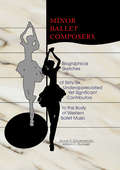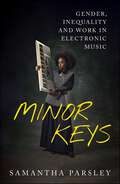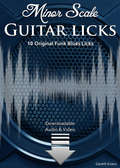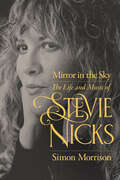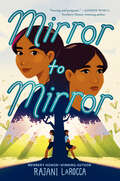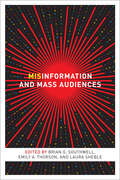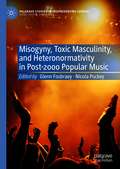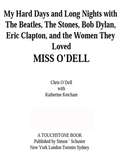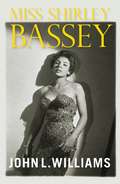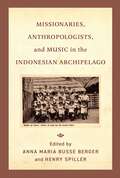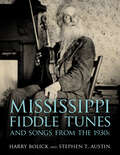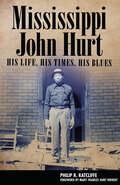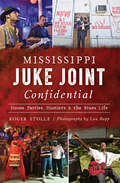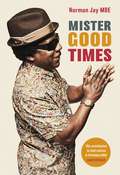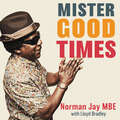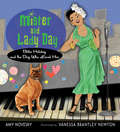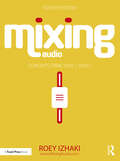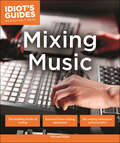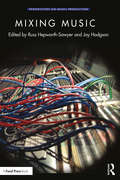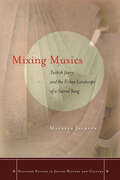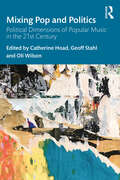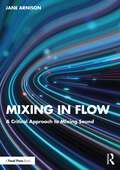- Table View
- List View
Ministry
by Al JourgensenMinistry is a memoir both ugly and captivating, revealing Al Jourgensen as a man who lived a hard life his own way without making compromises. He survived prolonged drug addiction--twenty-two years of chronic heroin, cocaine, and alcohol abuse, to be more precise--before cleaning up, straightening out, and finding new reasons to live.During his career, Jourgensen has engaged in all of the rock 'n' roll clichés regarding decadence and debauchery and invented new forms of previously unachieved nihilism. Despite this and his addictions, he created seven seminal albums, including the bonafide, hugely influential classic The Land of Rape and Honey, 1989's The Mind is a Terrible Thing to Taste, and 1992's blockbuster Psalm 69: The Way to Succeed.Ministry imparts the epic life of Al Jourgensen, a survivor who tempted fate, beat the odds, persevered, and put the pieces back together after unraveling completely.
Minor Ballet Composers: Biographical Sketches of Sixty-Six Underappreciated Yet Significant Contributors to the Body of West
by William E Studwell Bruce R SchuenemanWhile most music lovers are familiar with the famous scores of Tchaikovsky, Delibes, and Stravinsky, many other lesser-known composers also wrote for the ballet. Several of these composers wrote almost exclusively for the ballet--and all enriched the world of dance. Minor Ballet Composers presents biographical sketches of 66 underappreciated ballet composers of the 19th and 20th centuries from around the world, along with selected stories from the ballets they helped create. While the composers’contributions to ballet music are emphasized, all aspects of their lives and works are touched upon. Plot summaries and excerpts from reviews of many of the ballets are also provided. Other topics of interest you’ll find covered in Minor Ballet Composers include: Les Six: Darius Milhaud, Louis Durey, Georges Auric, Arthur Honegger, Francis Poulenc, and Germaine Tailleferre--and their relationship with Erik Satie and Jean Cocteau how politics, revolutions, and wars have affected composers and their works who studied with whom; who collaborated with whom schools, movements, and musical renaissance the importance of opera to ballet music the relationship between film scores and ballet music which books, plays, stories, and folk tales certain ballets are based upon where many of these ballets premieredMinor Ballet Composers emphasizes the importance of second-tier composers and their influence on the rich tradition of music written for the dance (though in some cases the music was appropriated for the ballet from other original designs). The gathering of these composers in a single volume in appreciation of their ballet music, with a glossary of choreographers and an index of ballet titles, makes this book a useful volume for ballet aficionados, music librarians, musicians, and others interested in dance and dance music.
Minor Keys: Gender, Inequality and Work In Electronic Music
by Samantha ParsleyWhat’s it like to work in the male-dominated world of electronic music? How do women and gender-expansive music producers and DJs thrive despite clubland’s so-called ‘bro culture’? This book combines the author’s personal journey into DJing and music production with insights from a six year immersive research project and interviews with 63 global artists to explore the challenges women and gender-expansive artists face in the industry. The book tackles common myths around gender, technology and cultural production head on, introducing the concept of ‘ameliorative work’ to recognise the continual and considerable additional work that minoritized genders do in order to succeed. Engaging, accessible and thought-provoking, this book is a must-read for anyone interested in electronic music, the sociology of the contemporary club scene or diversity issues for workers in the creative industries.
Minor Scale Guitar Licks: 10 Original Funk Blues Licks with Audio & Video (Modal Guitar Licks #6)
by Gareth Evans10 original funk blues guitar licks from the Minor scale in tablature and notation for the progressing guitarist at intermediate level and above. >> 55 bars of music over 10 licks (average lick length 5.5 bars) >> Video at full speed & Audio at full & half speed (Downloadable) >> Backing tracks at full and slower practise speeds (Downloadable) >> Scale diagrams with theory and technique tips for each lick >> Guitar tablature has picking directions & fretting finger guide numbers Please Note: This eBook has written music and is not suitable for smaller screens.
Miracle
by Karen S. ChowA glittering story about life and loss that follows Amie as she learns to heal and move forward over the course of a life-changing year, for fans of When You Trap a Tiger and The Remarkable Journey of Coyote Sunrise. Amie has spent her life perfectly in tune with Ba-ba, her father—she plays the violin, his favorite instrument; she loves all his favorite foods, even if he can&’t eat them during his cancer treatments; and they talk about books, including Amie&’s favorite series, Harry Potter. But after Ba-ba dies, Amie feels distanced from everyone close to her, like her mother and her best friends, Rio and Bella. More devastating still, she loses her ability to play the violin—the notes that used to flow freely are now stilted and sharp. Will Amie ever find her way back to the music she once loved? With hope and harmony lighting the way—and with help from the people who care about her most—Amie must find the strength to carry on. In the end, she&’ll learn that healing, while painful, can be its own miraculous song. Advance Praise for Miracle: "A beautifully written debut about family, friendship, and life after loss. Miracle will be a miracle for the readers who need it." —Dusti Bowling, bestselling author of Insignificant Events in the Life of a Cactus and The Canyon's Edge "A symphony of loss and healing that's certain to tug at your heartstrings." —Cindy Baldwin, author of Where the Watermelons Grow "Genuine, sincere, authentic—this book is a gift to readers." —Mary E. Lambert, author of Family Game Night and Other Catastrophes "A touching book about a difficult subject. It brings a quiet hope to young readers who may be dealing with their own loss, showing that they can find a path forward even after the hardest events." —Melissa Dassori, author of J.R. Silver Writes Her WorldA CCBC BEST BOOK OF THE YEAR "A moving, musical interlude on grief ... a great pick for anyone with a love of music or with a cloud of grief lingering over them. Hand to fans of Lynne Kelly, Christine Day, and Paul Acampora." —Booklist "Bolstered by an undercurrent of hope, Chow honors the tween protagonist&’s complexities and priorities as explored via Amie&’s candid voice.&” —Publishers Weekly "This lyrical narrative weaves in musical elements to effectively describe the complexity of Amie&’s grief and its effects on her love for music." —BCCB "Perfect for middle school music nerds, especially those undergoing personal turmoil." —School Library Journal
Mirror in the Sky: The Life and Music of Stevie Nicks
by Simon MorrisonA stunning musical biography of Stevie Nicks that paints a portrait of an artist, not a caricature of a superstar. Reflective and expansive, Mirror in the Sky situates Stevie Nicks as one of the finest songwriters of the twentieth century. This biography from distinguished music historian Simon Morrison examines Nicks as a singer and songwriter before and beyond her career with Fleetwood Mac, from the Arizona landscape of her childhood to the strobe-lit Night of 1000 Stevies celebrations. The book uniquely: Analyzes Nicks's craft—the grain of her voice, the poetry of her lyrics, the melodic and harmonic syntax of her songs.Identifies the American folk and country influences on her musical imagination that place her within a distinctly American tradition of women songwriters.Draws from oral histories and surprising archival discoveries to connect Nicks's story to those of California's above- and underground music industries, innovations in recording technology, and gendered restrictions.
Mirror to Mirror
by Rajani LaRoccaRajani LaRocca, recipient of a Newbery Honor and Walter Award for Red, White, and Whole, is back with an evocative novel in verse about identical twin sisters who do everything together—until external pressures threaten to break them apart.Maya is the pragmatic twin, but her secret anxiety threatens to overwhelm her.Chaya is the outgoing twin. When she sees her beloved sister suffering, she wants to tell their parents—which makes Maya feel completely betrayed. With Maya shutting her out, Chaya makes a dramatic change to give her twin the space she seems to need. But that’s the last thing Maya wants, and the girls just drift further apart.The once-close sisters can’t seem to find their rhythm, so they make a bet: they’ll switch places at their summer camp, and whoever can keep the ruse going longer will get to decide where they both attend high school—the source of frequent arguments. But stepping into each other’s shoes comes with its own difficulties, and the girls don’t know how they’re going to make it.This emotional, lyrical story will speak to fans of Ali Benjamin, Padma Venkatraman, and Jasmine Warga.
Mis pedazos rotos: Sanando las heridas del abuso sexual a través de la fé, la familia y el amor
by Rosie RiveraPor ser la más pequeña de los Rivera, Rosie estuvo rodeada de amor incondicional, apoyo y afecto, y no había nada que su familia no habría hecho por ella, en particular su hermana Jenni, quien, para Rosie, era lo más importante en el mundo. Con una fuerte voluntad y principios sólidos, Rosie estaba lista para conquistar el mundo. Sin embargo, su vida daría un vuelco drástico cuando Rosie fue marcada por el abuso sexual del que fue objeto dentro de su familia a una muy temprana edad. Viviendo con miedo y oprimida por secretos dolorosos, estuvo agobiada por amenazas constantes, confusión y dolor. No sólo le fue arrebatada su infancia, sino también su confianza y su autoestima. Sintiéndose completamente hecha pedazos y perdida, Rosie se hundió en un mundo de hábitos destructivos y en una profunda depresión.Por primera vez y con inquebrantable franqueza y valentía, Rosie comparte los traumáticos detalles de los abusos que sufrió, de su lucha diaria para salir adelante y de cómo gracias al cariño de su familia encontró, una vez más, el amor. Pero aún así, poco después la vida de Rosie sería duramente impactada otra vez cuando fue sacudida por la peor tragedia que podría haber imaginado y su más mayor miedo se hizo realidad: la muerte de su amada hermana.En la misma medida desgarradora y edificante, la historia de Rosie constituye un testimonio verídico sobre la superación de la adversidad y una muestra de que a pesar de vivir los peores momentos posibles y sin importar cuántos retos se presenten en la vida, es siempre posible sobreponerse a las desgracias y encontrar la fuerza y la voluntad necesarias para soñar y vivir nuevamente. CON FOTOGRAFÍASPrólogo de Mryka Dellanos.From the Trade Paperback edition.
Misinformation and Mass Audiences
by Brian G. Southwell, Emily A. Thorson, and Laura ShebleLies and inaccurate information are as old as humanity, but never before have they been so easy to spread. Each moment of every day, the Internet and broadcast media purvey misinformation, either deliberately or accidentally, to a mass audience on subjects ranging from politics to consumer goods to science and medicine, among many others. Because misinformation now has the potential to affect behavior on a massive scale, it is urgently important to understand how it works and what can be done to mitigate its harmful effects. Misinformation and Mass Audiences brings together evidence and ideas from communication research, public health, psychology, political science, environmental studies, and information science to investigate what constitutes misinformation, how it spreads, and how best to counter it. The expert contributors cover such topics as whether and to what extent audiences consciously notice misinformation, the possibilities for audience deception, the ethics of satire in journalism and public affairs programming, the diffusion of rumors, the role of Internet search behavior, and the evolving efforts to counteract misinformation, such as fact-checking programs. The first comprehensive social science volume exploring the prevalence and consequences of, and remedies for, misinformation as a mass communication phenomenon, Misinformation and Mass Audiences will be a crucial resource for students and faculty researching misinformation, policymakers grappling with questions of regulation and prevention, and anyone concerned about this troubling, yet perhaps unavoidable, dimension of current media systems.
Misogyny, Toxic Masculinity, and Heteronormativity in Post-2000 Popular Music (Palgrave Studies in (Re)Presenting Gender)
by Glenn Fosbraey Nicola PuckeyThis book presents chapters that have been brought together to consider the multitude of ways that post-2000 popular music impacts on our cultures and experiences. The focus is on misogyny, toxic masculinity, and heteronormativity. The authors of the chapters consider these three concepts in a wide range of popular music styles and genres; they analyse and evaluate how the concepts are maintained and normalized, challenged, and rejected. The interconnected nature of these concepts is also woven throughout the book. The book also seeks to expand the idea of popular music as understood by many in the West to include popular music genres from outside western Europe and North America that are often ignored (for example, Bollywood and Italian hip hop), and to bring in music genres that are inarguably popular, but also sit under other labels such as rap, metal, and punk.
Miss O'Dell
by Katherine Ketcham Chris O'DellCHRIS O'DELL WASN'T FAMOUS. SHE WASN'T EVEN ALMOST FAMOUS. BUT SHE WAS THERE. * She was in the studio when the Beatles recorded The White Album, Abbey Road, and Let It Be, and she sang in the "Hey Jude" chorus. * She lived with George Harrison and Pattie Boyd and unwittingly got involved in Pattie's famous love story with Eric Clapton. * She's the subject of Leon Russell's "Pisces Apple Lady." * She worked for the Rolling Stones on their infamous 1972 tour and did a drug run for Keith Richards. * She's "the woman down the hall" in Joni Mitchell's song "Coyote," the "mystery woman" pictured on the Stones album Exile on Main Street, and the "Miss O'Dell" of George Harrison's song. The remarkable, intimate story of an ordinary woman who lived the dream of millions--to be part of rock royalty's inner circle--Miss O'Dell is a backstage pass to some of the most momentous events in rock history.
Miss Shirley Bassey
by John L. WilliamsFrom "Hot from Harlem" to "Goldfinger," the story of how a two-bit jazz singer from Cardiff became an immortal icon: In 1954, Shirley Bassey was seventeen years old. She had just returned from a cheesy revue tour called "Hot from Harlem". Depressed, disillusioned and four months' pregnant, she decided that her dream of being a professional singer was over. A mere ten years later, she was one of the biggest stars in the world. She had sold more records than any other British singer of the day, and was poised to conquer America. Her latest hit, "Goldfinger", was the theme tune to the year's blockbuster film. No longer the two-bit jazz singer from Cardiff, she was by now an international sex siren, as glamorous and unreal as Bond himself.Miss Shirley Bassey explores this remarkable transformation, both of an individual and of the British society and British psyche that made it possible. From the vibrant, multicultural oasis of Tiger Bay in the Cardiff docklands through the club-lands of Soho and Las Vegas to New York's Carnegie Hall, it is a journey from mere mortal to international icon. Along the way she would encounter homosexual husbands, predatory managers, newspaper scandals, and a range of friends and acquaintances from Sammy Davis Jr. to Reggie Kray.John L. Williams draws on original research and interviews to provide a portrait of a young woman on the cusp of stardom, whose rise to fame was in many ways symbolic of a changing world. Brilliantly written non-fiction in the style of David Peace's The Damned Utd or Nick Tosches' Dino, this is the story of a woman who set out to be extraordinary and--against all the odds--succeeded.
Missionaries, Anthropologists, and Music in the Indonesian Archipelago
by Anna Maria Busse Berger and Henry SpillerA free ebook version of this title is available through Luminos, University of California Press's Open Access publishing program. Visit www.luminosoa.org to learn more. Although the history of Indonesian music has received much attention from ethnomusicologists and Western composers alike, almost nothing has been written on the interaction of missionaries with local culture. This study represents the first attempt to concentrate on the musical dimension of missionary activities in Indonesia. In fourteen essays, a group of distinguished scholars show the complexity of the topic: while some missionaries did important scholarship on local music, making recordings and attempting to use local music in services, others tried to suppress whatever they found. Many were collaborating closely with anthropologists who admitted freely that they could not have done their work without them. And both parties brought colonial biases into their work. By grappling with these realities and records, this book is a collective effort to decolonize the project of making music histories.
Mississippi Fiddle Tunes and Songs from the 1930s (American Made Music Series)
by Harry Bolick Stephen T. AustinWhile in the Mississippi State Archives tracking down Abbott Ferriss's beautiful photographic portraits of musicians from 1939, author Harry Bolick discovered, to his amazement, a treasure trove of earlier fiddle tunes in manuscript form. Since then he has worked to understand how this collection came to exist and be set aside. With Stephen T. Austin, Bolick has transcribed the subsequent 1939 audio recordings. Mississippi Fiddle Tunes and Songs from the 1930s presents the history of the collecting work, with over three hundred of the tunes and songs and a beautiful selection of period photographs. In the summer of 1936, over one hundred fiddle tunes, many of them unique, along with thousands of songs, were collected and notated throughout a large part of Mississippi. Roughly 130 novice field workers captured beautiful tunes and tantalizing fragments. As a body of work, it is an unparalleled and fascinating snapshot of vernacular music as heard in Mississippi in the early part of the recorded era. However, this music was unpublished and forgotten. In 1939, building on the contacts made three years earlier, Herbert Halpert led one of the last and best executed of the WPA folklore projects which recorded audio performances in Mississippi. Some, but not all, of those distinctive fiddle tune recordings have been published. Additionally, through cassette tape copies passed hand to hand, some of these distinctive tunes have regained currency and popularity among contemporary fiddlers. In Mississippi Fiddle Tunes and Songs from the 1930s, this great music is at last widely available. Selected tunes in this book are available from Document Records. Get Harry Bolick's CD with 22 tunes from the book, more information, a video, and free downloads of the sound files at www.mississippifiddle.com.
Mississippi John Hurt: His Life, His Times, His Blues (American Made Music Series)
by Philip R. RatcliffeWinner, Best History, 2012 Association for Recorded Sound Collections Award for Excellence in Historical Recorded Sound ResearchWhen Mississippi John Hurt (1892-1966) was "rediscovered" by blues revivalists in 1963, his musicianship and recordings transformed popular notions of prewar country blues. At seventy-one he moved to Washington, D.C., from Avalon, Mississippi, and became a live-wire connection to a powerful, authentic past. His intricate and lively style made him the most sought after musician among the many talents the revival brought to light.Mississippi John Hurt provides this legendary creator's life story for the first time. Biographer Philip Ratcliffe traces Hurt's roots to the moment his mother Mary Jane McCain and his father Isom Hurt were freed from slavery. Anecdotes from Hurt's childhood and teenage years include the destiny-making moment when his mother purchased his first guitar for $1.50 when he was only nine years old. Stories from his neighbors and friends, from both of his wives, and from his extended family round out the community picture of Avalon. US census records, Hurt's first marriage record in 1916, images of his first autographed LP record, and excerpts from personal letters written in his own hand provide treasures for fans. Ratcliffe details Hurt's musical influences and the origins of his style and repertoire. The author also relates numerous stories from the time of his success, drawing on published sources and many hours of interviews with people who knew Hurt well, including the late Jerry Ricks, Pat Sky, Stefan Grossman and Max Ochs, Dick Spottswood, and the late Mike Stewart. In addition, some of the last photographs taken of the legendary musician are featured for the first time in Mississippi John Hurt.
Mississippi Juke Joint Confidential: House Parties, Hustlers & the Blues Life
by Roger StolleJuke joint--two words often used, often abused. They convey an inherent promise of something real, edgy, from another time. All juke joints are blues clubs, but not all blues clubs are jukes. Here, artist recollections and insights delve below the murky surface to tell the tales, canonize the characters and explain the special brand of blues bottled in these quasi-legal establishments. Author Roger Stolle works from the inside to educate and entertain with a mix of history, anecdote and discovery. It's a wild ride.
Mister Good Times
by Norman JayTHE LIFE STORY OF THE LEGENDARY BRITISH DJ, NORMAN JAY MBE 'Full of the heart and spirit Norman Jay brings to his music, but it also offers a salutary account of growing up as part of the Windrush generation in London's Notting Hill, the violence and racism he faced, and his success' ObserverMister Good Times is the enthralling story of a black kid growing up in a (largely white) working class world; of vivid, often violent experiences on the football terraces; of the emerging club scene growing out of a melting pot of styles; of how Jay, with his contemporaries, took the music of Black America, gave it a distinctly London twist, and used the marriage of styles to forge a hugely successful career as a trailblazing DJ and broadcaster, becoming an inspiration to a whole generation of dance music fans, black and white, without ever compromising his integrity.Along the way are tales of adventures across the country following Spurs; of Northern Soul nights, warehouse parties and illegal raves; of sound systems, the good and bad times of the Notting Hill carnival, the heady days of pirate radio, Rare Groove and the burgeoning British dance music scene.Mister Good Times is the story of a man who has lived his life on his own terms, helping to define a new British culture.
Mister Good Times
by Norman JayTHE ENTHRALLING LIFE STORY OF THE LEGENDARY DJ, NORMAN JAY MBE 'Norman Jay's contribution to club culture is immeasurable . . . He brought new life to undiscovered classics and in doing so turned on a whole new generation' David Rodigan'Full of the heart and spirit Norman Jay brings to his music, but it also offers a salutary account of growing up as part of the Windrush generation in London's Notting Hill, the violence and racism he faced, and his success' ObserverMister Good Times is the enthralling story of a black kid growing up in a (largely white) working class world; of vivid, often violent experiences on the football terraces; of the emerging club scene growing out of a melting pot of styles; of how Jay, with his contemporaries, took the music of Black America, gave it a distinctly London twist, and used the marriage of styles to forge a hugely successful career as a trailblazing DJ and broadcaster, becoming an inspiration to a whole generation of dance music fans, black and white, without ever compromising his integrity.Along the way are tales of adventures across the country following Spurs; of Northern Soul nights, warehouse parties and illegal raves; of sound systems, the good and bad times of the Notting Hill carnival, the heady days of pirate radio, Rare Groove and the burgeoning British dance music scene.Mister Good Times is the story of a man who has lived his life on his own terms, helping to define a new British culture.
Mister and Lady Day: Billie Holiday and the Dog Who Loved Her
by Vanessa Brantley Newton Amy NoveskyBillie Holiday—also known as Lady Day—had fame, style, a stellar voice, big gardenias in her hair, and lots of dogs. She had a coat-pocket poodle, a beagle, Chihuahuas, a Great Dane, and more, but her favorite was a boxer named Mister. Mister was always there to bolster her courage through good times and bad, even before her legendary appearance at New York’s Carnegie Hall. Newton’s stylish illustrations keep the simply told story focused on the loving bond between Billie Holiday and her treasured boxer. An author’s note deals more directly with the singer’s troubled life, and includes a little-known photo of Mister and Lady Day!
Mixing Audio: Concepts, Practices, and Tools
by Roey IzhakiMixing Audio: Concepts, Practices, and Tools is a vital read for anyone wanting to succeed in the field of mixing—covering the entire mixing process, from fundamental concepts to advanced techniques. Packed full of photos, graphs, diagrams, and audio samples, it teaches the importance of a mixing vision, how to craft and evaluate your mix, and then take it a step further. Mixing Audio describes the theory, the tools, and how these are put into practice while creating mixes. The companion website, featuring over 2,000 audio samples as well as Multitrack Audio Sessions, is a perfect complement to the book. The new edition includes: An extension of the discussion on mastering which now includes the loudness war, LUFS targets, and DIY mastering Updated figures and illustrations throughout A new section covering console emulation
Mixing Music (Idiot's Guides)
by Michael MillerIdiot's Guides: Mixing Music breaks down all the complex jargon for beginners and discussing a blend of skillful principles and techniques that anyone can utilize when mixing. It covers all the fundamentals from the various mixing styles, the element of a mix and how to build one, the rules of arrangement, the secrets of equalization and frequencies. This guide is packed full of expert advice and be platform neutral for any home mixer. Also includes: • In-depth review of budget-friendly music equipment and purchasing. • Chock full of tips, tricks, and techniques on perfecting mixes. • Easy-to-comprehend breakdown of terms and techniques that any mixer can master. • The fundamentals of music mixing, breaking the process down so readers understand the basics. • The building blocks of mixing: reverb, blend, size, tone, sustaining sound, delay types and how to calculate them, balancing, and sonic layering. • Reviews of the various mixing styles, rules for arrangement, and all the tips and tricks for adding effects and creating that perfect sound. • An exploration of the current mixing techniques and principles. • In-depth discussion on the essential home recording budget-conscious mixer needs, what equipment to purchase and what to avoid, and whether or not to use freeware.
Mixing Music (Perspectives on Music Production)
by Jay Hodgson Russ Hepworth-SawyerThis series, Perspectives On Music Production, collects detailed and experientially informed considerations of record production from a multitude of perspectives, by authors working in a wide array of academic, creative, and professional contexts. We solicit the perspectives of scholars of every disciplinary stripe, alongside recordists and recording musicians themselves, to provide a fully comprehensive analytic point-of-view on each component stage of record production. Each volume in the series thus focuses directly on a distinct aesthetic "moment" in a record’s production, from pre-production through recording (audio engineering), mixing and mastering to marketing and promotions. This first volume in the series, titled Mixing Music, focuses directly on the mixing process. This book includes: References and citations to existing academic works; contributors draw new conclusions from their personal research, interviews, and experience. Models innovative methodological approaches to studying music production. Helps specify the term "record production," especially as it is currently used in the broader field of music production studies.
Mixing Musics: Turkish Jewry and the Urban Landscape of a Sacred Song
by Maureen JacksonThis book traces the mixing of musical forms and practices in Istanbul to illuminate multiethnic music-making and its transformations across the twentieth and twenty-first centuries. It focuses on the Jewish religious repertoire known as the Maftirim, which developed in parallel with "secular" Ottoman court music. Through memoirs, personal interviews, and new archival sources, the book explores areas often left out of those histories of the region that focus primarily on Jewish communities in isolation, political events and actors, or nationalizing narratives. Maureen Jackson foregrounds artistic interactivity, detailing the life-stories of musicians and their musical activities. Her book amply demonstrates the integration of Jewish musicians into a larger art world and traces continuities and ruptures in a nation-building era. Among its richly researched themes, the book explores the synagogue as a multifunctional venue within broader urban space; girls, women, and gender issues in an all-male performance practice; new technologies and oral transmission; and Ottoman musical reconstructions within Jewish life and cultural politics in Turkey today.
Mixing Pop and Politics: Political Dimensions of Popular Music in the 21st Century
by Catherine HoadThe political has always been part of popular music, but how does that play out in today’s musical and political landscape? Mixing Pop and Politics: Political Dimensions of Popular Music in the 21st Century provides an innovative exploration of the complex politics of popular music in its contemporary formations.Amid the shifting paradigms of power in the 2020s, the chapters in this book go beyond the idea of popular music as protest to explore how resistance, subversion, containment, and reconciliation all interact in the popular music realm. Covering a wide range of international artists and genres, from South African hip-hop to Polish punk, and addressing topics such as climate change and environmentalism, feminism, diasporic identity, political parties, music-making as labour, the far right, conservatism and nostalgia, and civic engagement, the contributors expand our understanding of how popular music is political.For students and scholars of music, popular culture, and politics, the volume offers a broad, exciting snapshot of the latest scholarship on contemporary popular music and politics.
Mixing in Flow: A Critical Approach to Mixing Sound
by Jane ArnisonMixing in Flow is a focused guide for mix engineers who are familiar with the basics of mixing and now seek greater consistency and refinement in their work. Rather than covering every fundamental aspect of mixing, it picks up where many mixers experience a plateau – when they know the mechanics but struggle with inconsistent or lacklustre results.This book begins by defining the art of mixing, before moving into an intensive bootcamp where readers delve deep into working with the essential tools and developing effective workflows to maximise their potential. Within this framework, special emphasis is placed on ear training and critical engagement with sound. Using a problem-based approach, the focus then shifts to mixing in practice, by exploring common mixing challenges from the perspective of what we hear, with various techniques offered for addressing these sonic issues. The final section covers advanced topics, providing further insights that follow on from the development of core mixing skills.Designed to inspire readers to develop their unique mixing flow and have confidence in their tools, Mixing in Flow is the ideal companion for anyone looking to improve their mixing, including students and aspiring professional engineers, as well as more experienced mixers looking for new inspiration and continued professional development.

